Today I have two poetry reviews for you. The first is the main one, because it’s such a long, representative work: Where Rockets Burn Through from Penned in the Margins Press, an anthology of British Science Fiction Poetry. But stick around for the review of a chapbook (Spaces of their Own) by the editor of the above anthology, Russell Jones. As usual, I have some (ok, this time a LOT) of listening for you, much of it read by the authors. I’ve done things a bit differently and interspersed the audio tracks of complete poems throughout the review, let me know what you think! Enjoy!
* * *
 As is often the case, while preparing this review, really delving into the poetry has brought it alive unlike just reading it does. This past year, writing for Amazing Stories, has really been a learning experience for me. Trying to formulate something intelligent to say about the poems opens their possible meanings just that little bit more. And with this anthology in particular, I find myself appreciating the work that went into putting it together. It is, I believe, truly a labor of love, thoughtfulness and close attention to the details of its contents. Each of the poems selected for this book could stand on its own, but as part of the collective, they exude so much more – for me, at least. The structure is clear, and yet, it doesn’t club you over the head. You can take it or leave it. And while the poems filed within a certain section may not necessarily, at face value, adhere to the theme, there was always something that made me think, “Yeah, that fits.” And as a result, something new about the poem popped out at me.
As is often the case, while preparing this review, really delving into the poetry has brought it alive unlike just reading it does. This past year, writing for Amazing Stories, has really been a learning experience for me. Trying to formulate something intelligent to say about the poems opens their possible meanings just that little bit more. And with this anthology in particular, I find myself appreciating the work that went into putting it together. It is, I believe, truly a labor of love, thoughtfulness and close attention to the details of its contents. Each of the poems selected for this book could stand on its own, but as part of the collective, they exude so much more – for me, at least. The structure is clear, and yet, it doesn’t club you over the head. You can take it or leave it. And while the poems filed within a certain section may not necessarily, at face value, adhere to the theme, there was always something that made me think, “Yeah, that fits.” And as a result, something new about the poem popped out at me.
Where Rockets Burn Through, edited by Russell Jones, is presented as an introduction to Science Fiction poetry. Or a survey, if you will, of what Science Fiction poetry can be. British Science Fiction poetry, that is or Scottish even. The anthology contains poetry by 50 or so Poets living and working in the UK, many of them in Scotland (as does Jones) as well as a handful of transplanted Americans and the odd Irishman. It’s a big anthology – at 208 pages and including nearly 100 poems in 4 sections, it’s a mammoth volume. Russell Jones, a poet in his own right (whose most recent chapbook I’ve reviewed at the end of this post), spent several years, he says, putting it together. Each section is begun with a poem by Edwin Morgan, Scotland’s Makar (Poet Laureate) until he passed away in 2010. The anthology closes with one by Morgan, as well. There are several other Big Names (Jane Yolen and Ken MacLeod – such because they also write, among other things, fiction and are most prolific) and several heavy weight poets who may not be but should be well known (Steve Sneyd – SF poet extraordinaire and Ron Butlin – Edinburgh’s Poet Laureate).
The anthology begins with a preface by Alasdair Gray, a Scotch writer and artist who illustrates his own books. In it he gives a definition of what Science Fiction is and what poetic works he considers to be Science Fiction (Dante’s Divine Comedy and Milton’s Paradise Lost) because they “take for granted the scientifically accepted. I agree with him. Then he goes on to describe the Science Fiction poems in this volume as lyrics – “verses short enough to be sung”. I like this definition as well, although I’d say that many of these poems would make bad songs, but are excellent poetry.
We have an introduction from Russell Jones in which he tells us of the inspiration and the  history of the anthology and how the loss of Edwin Morgan pushed him into the decision to create this volume. It’s interesting to read how, as a poet, Jones hadn’t encountered Science Fiction poetry much until he read Edwin Morgan’s. He wrote some himself and it wasn’t until he started gathering poems for this anthology that he discovered that there’s a whole little world for SF poets.
history of the anthology and how the loss of Edwin Morgan pushed him into the decision to create this volume. It’s interesting to read how, as a poet, Jones hadn’t encountered Science Fiction poetry much until he read Edwin Morgan’s. He wrote some himself and it wasn’t until he started gathering poems for this anthology that he discovered that there’s a whole little world for SF poets.
And finally we have a mind-boggling and yet illuminating essay by Steve Sneyd – “Wormholeing into Elsewhere”. In addition to being a prolific SF poet, Sneyd has been in the business of anthologizing and promoting Science Fiction Poetry for many, many years. Who knows how many essays about it and various aspects of it and people who write it he’s written. He would make an interesting subject for a university dissertation or perhaps a biography. This essay makes a compelling case for the fact that our highly scientific world today is a veritable mine-field for poets. Whether a poem is actually Science Fictional or not “depends on context”, but there is fodder enough. Taking his cue from Edwin Morgan, who said “”The poet, I think, is entitled to set up his camp on other worlds than this.” Sneyd goes on to conjecture that poets are entitled to use anything and everything at their disposal to create the questions in our minds that technology has yet to answer.
The poems are grouped into four groups, the title of each section gleaned from a poem by Edwin Morgan. As I mentioned above, the first poem in each section is one by Morgan himself and sets the mood for poems that follow.
Every one of the poets featured on audio in this review has provided me with a biography and additional links and it would be much appreciated if you would head over to my personal blog for these “show notes” and check out at least those poets whose work you liked best! The Diva’s Divine Days: https://divadianes.blogspot.com/ Go on – show them some love!
* * *
Section I “Home in Space” – The anthology opens with poems that, each in their own way explore relationships to and concepts of home, what happens to those when our home base has changed or is lost. Many show the longing for a home, which is not here, but rather there, perhaps even in space.
With much time for thought, I brooded on
that icy noctiluca:
might one live in it?
– from “The Man in the Moon”, by Matthew Francis
Listen:
“Our Flight to the Moon”, by Jane McKie
What would it be like living in space or on another planet? After watching Gravity, we all might have a better idea, at least it is clear that it is a pretty inhospitable out there:
years without seasons
pass by in eternal night –
lost generation
– from “Alone Against the Night”, by Andrew J Wilson
Listen:
“space poets”, by James McGonigal
(The anthology has a few poems in a sort of Scottish, which for a non-Brit is sometimes basically incomprehensible but below is one which even I could decipher)
The thing I miss maist? Whit I’d love tae dae
is open up a windae, but I’ll hae
tae thole this polydome a guid while mair
afore the outside atmosphere’s complete.
– from “Life on Mars”, by James Robertson
And whatever ideas we have about the Universe it is most probably not a black and white matter:
Listen:
“The Wow! Signal”, by Sarah Hesketh
“Holidays on LV-246”, by Andy Jackson
What exactly do we hope to achieve by going into space? At this point we are ensconced in research, discovery. I love following the Facebook page of the Cassini Mission to Saturn and the knowledge we’ve accrued thus far is astounding, fascinating and seductive. Could there be “life” on X? The beginnings anyway? What happens if we screw up?
Listen:
“A Barren Moon”, by Simon Barraclough
Please listen to a couple more examples from this section, which I couldn’t resist including for their unique forms:
“Second Coming”, by Jane Yolen
“Rave Quails!”, by Dilys Rose
* * *
Section II “Hold Hands Among the Atoms” – In this section the poems seem to explore our relationships to each other, to the Other and to ourselves (in an alter-ego kind of way). It’s astonishing how richly the human condition can be described. Many of the poems in this section are narrative, telling a story, these use the Science Fiction tropes very well to pack a punch.
we are listening for an answer
to our selves; why
stars in the vastness sing,
– from “We are listening”, by Sarah Westcott
* * *
And way off, if I pin my breath
into my throat, there’s also
you…
– from “Mothership”, by Claire Askew
Listen:
“The Costume”, by Aiko Harman
“Red Ribbon”, by Ian McLachlan
“The Check-up”, by Kirsten Irving
“The Last Human”, by Kona MacPhee
* * *
Section III “From the Video Box” – And what would a work of Science Fiction with out a few “big dumb objects”?!? These poems use machines or objects and a general futuristic setting or familiar SF trope to tickle our fancies.
A number equaling all the electrons
in all the solar cells in all the probe droids
that spy on lovers nakedly colliding
from strands of space debris, loveless, unblinking.
– from “Catullus 70”, by Jon Stone
* * *
Founded on old films and photograph albums
I used to think that up until the nineteen-sixties
the world had been black and white.
– from “Monochrome”, by Lorraine Mariner
Listen:
“Ice Station Zog”, by WN Herbert
“Merciless”, by Andrew J. Wilson
(Previously Published in Weird Tales #361)
Many of the poems naturally question our reliance (dependence?) on computers and the like:
freefloat holograms alternate messages say
all lanes closed wait calm
and random as screensaver seems
metaphilosophy as eg dead loss
all your lives be grateful
– from “Infoworship”, by Steve Sneyd
And others play on our obsession with pop culture.
Listen:
“The Trekker’s Wife”, by Claire Askew
Sue Guiney’s poem “What Can Be Taught” questions what it is, actually, that we (well, some of us) take away from school. What is truly important?
“What Can Be Taught”, by Sue Guiney
* * *
Section IV “The Ages”– Most beloved of SF tropes Time and Time Travel is the focus of this section, where we go to the past and to the future and to dates indeterminate, sometimes literally and sometimes just in the mind. Edwin Morgan’s opening poem “Geode” sets the stage:
and earth heaves, the years
run in millions over your knuckles
like a quite tactic quicksilver.
Have a listen to “Succession” in which Ken MacLeod likens time to roads:
“Succession”, by Ken MacLeod
The words “perpetual war” invoke an expanse of time. Ron Butlin, Poet Laureate of Edinburgh wrote one of the longer poems in the volume. Listen:
“Three Composers Respond to the Politics of Perpetual War” by Ron Butlin
“From the Unofficial History of the European Southern Observatory in Chile”, by Pippa Goldschmidt
“Devil at the End of Love“, by Chrissy Williams
* * *
If you would like to hear even more audio examples from this anthology head over to the Nature Podcast from 19 December 2013. They produced 5 more poems, some of them I would’ve included here.
As a whole, I think this is a very important anthology, which showcases Science Fiction Poetry from the British Isles. The quality of poetry within is stratospherical and I hope you got a sense of that from this review. I don’t think there’s a dud in there. And there’s so much which makes you catch your breath or gives little goosebumps. There’s a wide variety of styles and lengths, which is not really surprising given that it’s an anthology, but an editor could choose only poetry that they like and if their tastes aren’t broad… it would be a detriment to the anthology. I think Jones successfully avoids (if that was his aim) a monochrome anthology. The world of Science Fiction and even more so SF poetry is so insular, that it can be a struggle to acquaint oneself with it in a broad sense. American and Canadian poets seem much easier to find (online) and I had to go a-looking for SF poets working in other markets. I’m so glad that I found Russell Jones! He has been very helpful finding other poets, especially through this anthology.
* * *
 I have had a poem of Jones’ “The Ant Swap” to use in what will be my next Poetry Planet for over a year now. He sent me a copy of his chapbook Spaces of Their Own for review. This little chapbook of 12 SF poems is a gem. It was published by Stewed Rhubarb Press, which has also just come out with an anthology called Naked Among Thistles – Lesbian, Gay, Bisexual, Transgender & Related Identities and Mental Wellbeing.
I have had a poem of Jones’ “The Ant Swap” to use in what will be my next Poetry Planet for over a year now. He sent me a copy of his chapbook Spaces of Their Own for review. This little chapbook of 12 SF poems is a gem. It was published by Stewed Rhubarb Press, which has also just come out with an anthology called Naked Among Thistles – Lesbian, Gay, Bisexual, Transgender & Related Identities and Mental Wellbeing.
For such a brief collection, there is astonishing variety in Spaces of Their Own. I guess Jones’ tastes are very broad indeed. I didn’t love all the poems within, but they were all worth reading, especially multiple times.
They present crazy, difficult and wonderful concepts ranging from how we are perceived by aliens in space and they to us (from down here) in “Blue Planet”; observation of monkeys’ to a piece of art in “Five Monkeys”; differing viewpoints in “The Ant Swap”; What might go on in our minds during cryogenic sleep in “Static Life”; Dream-experience a girl’s dream as you would listen to an audio book in “girl.drm”; The stars, a puzzle, you and me in the wonderful “Ghazal Jigsaw”; A shape poem in “Star”; A dialogue among protons in the Large Hadron Collider in “The Bang”; The dangers, desolation and emptiness of space scavenging in “After the Moons”; Thoughts after beaming gone bad in “Teleportation Error”; A computer’s view of Life in “Condemnations from a Laptop”; Three views of conception/humanity through time in “Chromosome Medley”; The “Happy Accident” of children tearing books apart in “Study: Siblings”; and finally to, burning up upon re-entry might not be so bad in “Re-entry”.
There is also a visually pleasing element to the poems and how they are presented, not just in the shape poem but the formatting of several of them is an important element, which I found heightened the impact and yet was never cheesy.
Spaces of Their Own has been nominated for the Elgin Award given for the 2nd time this year by the Science Fiction Poetry Association, voted on by the members. The poem “After the Moons” was nominated for the SFPA’s Rhysling Award also voted on by the members. Listen to it in its entirety, read by the author:
Thanks for sticking around for both reviews. I hope to be reviewing more Science Fiction Poetry from the British Isles and elsewhere (Australia, New Zealand, South Africa, anywhere!) in the future! Next up however is a collection of linked poetry about the first colony on Mars: Blue Sunset, by Mary Jo Rabe.
* * *
All Contents © Copyright 2011-2014 Amazing Stories Magazine. All Rights Reserved. Individual works remain the property of and are © Copyright of their individual creators. Content may not be reproduced without the express written consent of the author.










Recent Comments